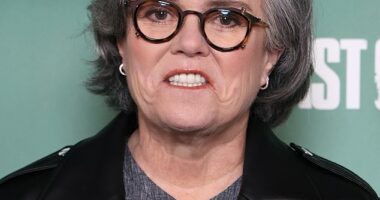Most Australians are yet to feel the direct impact of the trade war between the United States and China, which has seen US tariffs on Chinese imports spike from 10 per cent in February to 145 per cent in April.
Last week she was forced to shut down the brand’s US website and pause all sales to the US as a result of US President Donald Trump’s skyrocketing tariffs, wiping out 20 per cent of RAQ’s revenue in the process.

“You remove 20 per cent of your revenue that can mean you’re not profiting at all,” Argyropoulos told 9news.com.au.
Though the brand is Australian owned and operated and all orders are shipped out of a warehouse in Melbourne, RAQ’s bikinis are manufactured in China and are therefore considered Chinese goods when being imported to the US.
That means that any orders RAQ sends to the US are subjected to Trump’s China tariffs.
So when he signed the first executive order imposing 10 per cent tariffs on Chinese goods in February, Argyropoulos passed the fee on to US customers.
Then, when the tariffs jumped to 20 per cent in March, she decided that RAQ would raise prices for US shoppers and absorb the cost of the tariffs.
But that tactic was not sustainable: When the tariffs skyrocketed to 145 per cent on April 9 that meant a RAQ bikini top priced at $95 would incur an additional $137.75 fee.
Absorbing the cost of 145 per cent import tariffs would wipe out the brand’s revenue entirely and there’s no way RAQ’s US customers would be willing to pay an extra $140 on top of an almost $100 bikini top.

Argyropoulos only saw one option for the brand.
“I made the call then and there to turn off our US website. We lost 20 per cent of our sales,” she said.
“We’re barely making a profit as it is, given the cost of living crisis and people not being able to spend as much, plus skyrocketing costs of running a business.”
But closing RAQ’s US website and pausing all US orders has raised new challenges for the small business.
Swimwear is a seasonal industry and RAQ usually relies on orders from the US to get through the cooler winter months when Aussies aren’t shopping for bikinis.
With winter less than two months away, the tariffs that forced Argyropoulos to pull out of the US market couldn’t have come at a worse time.
“Our business model relies on us pivoting to the US at this time of year to generate some cash flow to pay for our production for the next season in Australia,” Argyropoulos said.
“So we’re literally turning that tap off.”
Cancelling the brand’s US marketing helped her save some cash but it won’t cover the cost of lost sales from the US market this winter, which could have a long-term impact on the business.

Moving manufacturing to Australia to get around Trump’s China tariffs isn’t an option either.
The bikini tops Argyropoulos designs are similar to bras and require specific technical skills to produce; technical skills which aren’t currently available in Australia.
If she wanted to produce the same designs in Australia, she’d have to invest a fortune into setting up a factory, buying machinery and training a whole new labour force.
It’s another cost she just can’t afford as a small business owner.
Not to mention that Argyropoulos has a years-long working relationship with her Chinese manufacturer and doesn’t want to put them out of work either.
Argyropoulos fears the situation will only get worse in the coming months.
Small businesses that manufacture products in China and rely on the US for the majority of their sales may not survive if Trump’s tariffs remain as they are or continue to rise.

RAQ’s sales have not recovered since Argyropoulos shut down the US website.
Now she’s turned her focus to breaking into the UK market and while she’s hopeful it will help the brand get through winter, there are no guarantees.
“You can’t just turn that on overnight,” she said.
“I’m trying to stay optimistic in that there are other markets out there, and I’m trying to focus on what I can control [but] I don’t know if I can just create a market out of nothing.”







